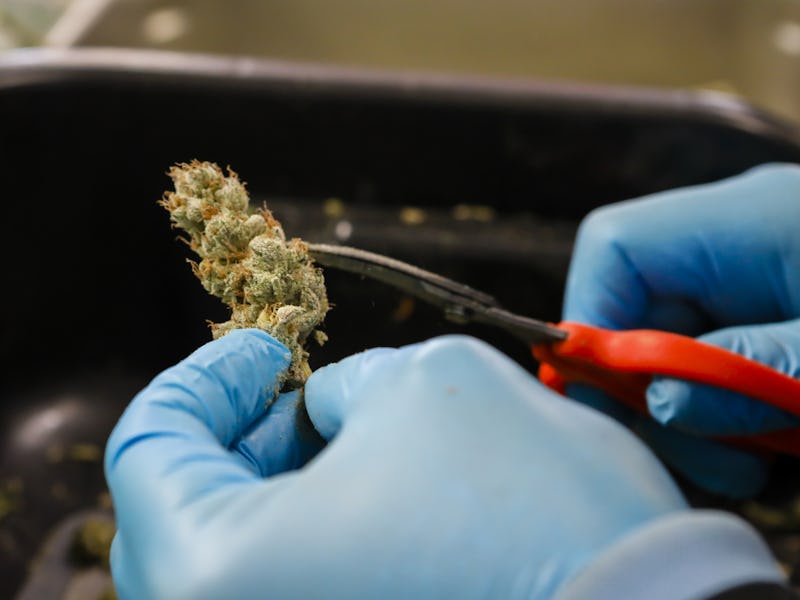A New Study Found This Molecule Is Linked to Less Anxiety While Stoned
Here’s clinical evidence that the terpene D-limonene is connected to lower anxiety while high.

Tetrahydrocannabinol (THC), the primary psychoactive component in cannabis, often gets all the attention when we think about the positive, psychoactive effects of marijuana. But there’s more to weed than THC, and a new study reveals one compound’s crucial role in weed’s ability to get us high.
Marijuana contains hundreds of compounds. While not all of them are mind-bending, some do help mediate the high experience. Among these non-psychoactive compounds are terpenes, which are molecules that give plants their aromatic qualities. A few famous terpenes are alpha-pinene and linalool, associated with pine and lavender respectively.
It turns out that even though terpenes don’t alter your state of mind in the same way THC does, they can still have effects on mood. The new paper, published in April in the journal Drug and Alcohol Dependence, attempted to better understand what role, if any, one particular terpene plays in getting high. The compound, known as D-limonene, which is also found in citrus fruits, appears to negate negative feelings that might come with getting stoned.
This paper details the results of a double-blind study involving 20 adults. Participants completed nine varied rounds during which they inhaled 15 or 30 milligrams of vaporized THC, 1 or 5 milligrams of the terpene D-limonene, the two together, or a placebo. Twelve of these participants conducted a tenth session during which they inhaled 30 mg of THC with 15 mg of D-limonene. The authors then measured subjects’ reported drug effects, cognitive and motor skills, vital signs, and blood concentrations of THC and D-limonene. Participants specified their subjective anxiety and paranoia levels, too.
The study found that the higher the dose of D-limonene, the more likely participants were to report lower levels of anxiety and paranoia. This means limonene could have what’s known as an anxiolytic effect. There didn’t appear to be any other changes incurred by limonene’s presence, either. Its effects were limited to feelings of anxiety.
“The specificity of this effect is what I think is really fascinating,” says senior author Ryan Vandrey, an experimental psychologist and professor of psychiatry and behavioral sciences at the Johns Hopkins University School of Medicine. “It was very specific to anxiety.” Other aspects, like increased appetite, didn’t change at all.
While the data show a strong link between increased limonene and decreased anxiety, the authors still aren’t sure of the mechanism at play that makes terpene influence feelings of anxiety. The doses administered also are much higher ratios than are naturally found in cannabis, so the upper limits of this study don’t reflect the typical toking experience.
Although terpenes’ primary trait is their aroma, Vandrey and his team weren’t interested in that at all. In fact, they did all they could to minimize exposure to D-limonene’s scent during the experiment. Rather, they wanted to see D-limonene’s internal effects, if there were any. The limonene was sealed in a vaporizer so nobody could smell it before inhaling. Then, participants exhaled through a filter to eliminate any airborne redolence. The one instant when aroma could potentially come through was during inhalation, when “you might get a little bit of a taste” of the aromatics. Still, Vandrey says they can’t completely rule out aroma’s effects.
In the context of the increasingly legal weed industry, it’s essential to understand the science behind different compounds. Vandrey says that the medicinal cannabis market might make unscientific claims about its products. For example, strategic marketing may state that products high in limonene will reduce anxiety, or that the terpene alpha-pinene, which gives pine its scent, will improve memory.
“Most of those claims are made without empirical data,” Vandrey says. “Our job as scientists is to see what claims are being made and then to test them.”
This isn’t to say that all terpenes have a calming effect, or even an effect at all. Vandrey and his team investigated alpha-pinene using the same model, and the preliminary data suggests it’s not anxiolytic. This is all part of the process, according to Vandrey.
“Sometimes we'll find support, and sometimes our results will refute those claims, but it's important to do that science,” he says.